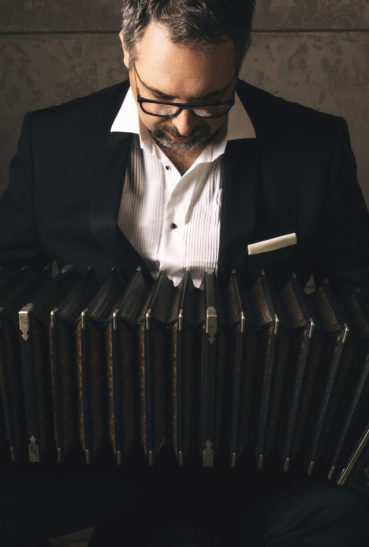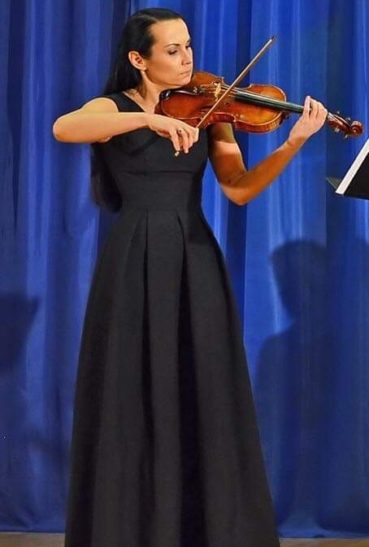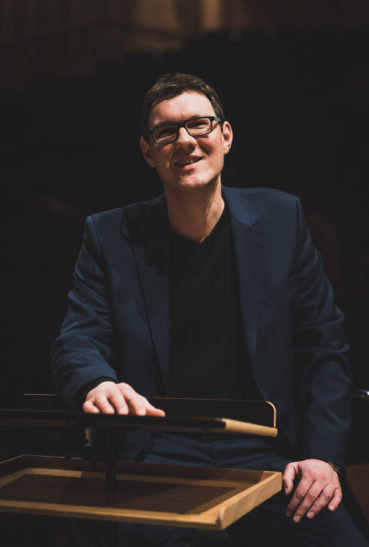ASTOR PIAZZOLLA – ONLINE
x
Concert on the occasion of the 100th birthday of Astor Piazzolla
Honorary patronage of the Embassy of Argentina in Poland
30th April 2021, 8:00 p.m.
Concert Hall of the Schools of Music Complex No. 1 in Warsaw – “New Miodowa”, 21 Rakowiecka Str.
Broadcast on YouTube channel
and www.sinfoniaiuventus.pl
Performers
Klaudiusz Baran | bandoneon
Justyna Baran | violin
Jerzy Semkow Polish Sinfonia Iuventus Orchestra
Marek Wroniszewski | conductor
Programme
Astor Piazzolla
Aconcagua – Concerto for bandoneon,
string orchestra and percussion
Tangazo for chamber orchestra
Adiós Nonino (ar. Urszula Borkowska)
Fuga y Misterio (ar. Tomasz Filipczak)
Oblivion (ar. Urszula Borkowska)
Libertango (ar. Urszula Borkowska)
Klaudiusz Baran, Justyna Baran – photo archiwum artystów; Marek Wroniszewski – photo Piotr Banasik
x
The origins of tango are not obvious – it is a genre of dance and song music, born in the 19th century in the notorious backstreets of Montevideo and Buenos Aires, port cities and melting pots of many immigrant nations. It combined elements of the habanera, other Latin dances and songs with influences from African-American music. The words of nostalgic songs, which almost always speak of love – difficult, disappointed and bygone – were accompanied by passionate and improvised dance. A typical ensemble accompanying tango was bandoneon, violin, piano and double bass. The heyday of tango art fell on the post-war period – it soon lost its original rebellious and plebeian connotations and become a genre trivialised in countless, cloying and less and less ambitious versions. After the WW2 it continued to be danced, but soon gave way to new fashions. The breakthrough and renaissance of the tango came with the achievements of Astor Piazzolla – the young Argentinian’s talent was noticed and supported by people such as Artur Rubinstein. Soon Piazzolla took up regular musical studies in France, where he pursued “classical” education under Nadia Boulanger – who, having heard his tangos, encouraged her student to abandon sonatas and symphonies in favour of his own path. The tango nuevo genre created by him (initially cursed in Argentina as a defiance of national tradition and even an “anarchistic” threat to successive juntas ruling the country) departed from its purely dance function and became autonomous music of high artistic value. The “classical” ensemble was sometimes expanded, however bandoneon has remained the most important carrier of melody and expression in tango nuevo. Piazzolla himself was a great virtuoso of this instrument. This trend proved to be invigorating and evolutionary, and it continues to inspire composers, jazzmen and dancers. The concert celebrating the centenary of the birth of this great reformer of the genre, which today has already become its “new classic”, will recall the most famous tangos, along with an interesting larger form – Concerto for bandoneon from 1979, described by the publisher of the work as Aconcagua, symbolically referring to the highest mountain peak in the Americas and the entire southern hemisphere.
The solo parts of the concert will be performed by bandoneonist Klaudiusz Baran (while the violinist Justyna Baran will perform solo in the moving Adiós Nonino tango) playing under the baton of Marek Wroniszewski. This virtuoso of bandoneon and accordion, highly valued both in Poland and abroad, moves with ease through a diverse repertoire of many eras. His interpretations of the latest music, however, are most appreciated, including nearly 50 world premieres of solo, chamber and orchestral works, which were mostly either dedicated to him or inspired by him. His great passion to Argentinian tango is best reflected in his renditions of tango nuevo, which he performs with dazzling virtuosity on the bandoneon, the instrument he introduced as the first Polish instrumentalist into concert halls. He co-created and lead the most famous tango formations, such as Tangata Quintet or Machina del Tango which created the Polish tango culture. Klaudiusz Baran combines artistic activity with pedagogical and organizational activity. He is a professor at the Fryderyk Chopin University of Music in Warsaw, and its rector since 2016. [pmac]
Organiser: Jerzy Semkow Polish Sinfonia Iuventus Orchestra
Media partners: TVP Kultura, Presto, polmic.pl
The organiser reserves the right to change the concert programme or its performers



